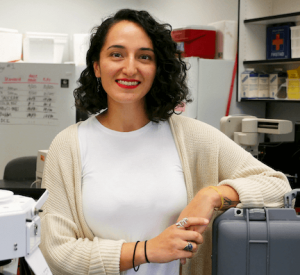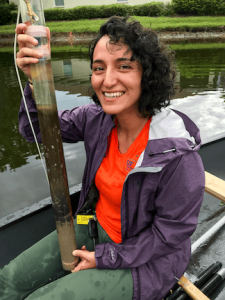Thesis: “Carbon Dynamics of Urban Stormwater Ponds: Burial, Gas Flux, and Dissolved Organic Matter Composition”
Topic: Permanently wet stormwater ponds are engineered control systems that are increasing in number on the landscape. Their purpose is to relieve flooding and filter out materials such as nutrients, particulates, and contaminants that are delivered through stormwater runoff. However, their morphologic and chemical conditions allow them to potentially play a significant role in altering biogeochemical cycles on the landscape, especially that of carbon. Although individually small in size, stormwater ponds collectively are estimated to make up just under one percent of Florida’s land area and remain under-researched. The goal of this study is to understand how small constructed aquatic systems intercept water from the landscape and transform carbon where it can either be stored, emitted to the atmosphere as a gas, or altered molecularly and sent downstream to naturally occurring streams, rivers, or wetlands.

Research Question: How do urban stormwater ponds impact regional carbon cycling, specifically related to carbon burial rates, greenhouse gas flux (CO2, CH4), and the composition of dissolved organic matter (DOM)?
“We are looking at five ponds over an age gradient,” Audrey Goeckner said. “Each one has no vegetation, so we can focus on inputs based on stormwater runoff and precipitation. They also do not include aeration systems – no fountains or bubblers – which is common.”
The ponds are located in Lakewood Ranch – a large, master-planned community that sits in the southeastern corner of Manatee County and northeastern Sarasota County. Each community development district there was set up one after the other over a span of about 20 years. That allows an age gradient of the ponds from 14 to 34 years.
“The reason that we’re doing that is to see if the rates of carbon accumulation or gas fluxes differ as these systems age,” Goeckner explained. “We hope by doing this we can make suggestions or inferences on how pond management can be handled as these human-engineered systems get older.”
“When Audrey and I first talked, I had this idea that her thesis should have some focus on stormwater ponds,” said Dr. Mary Lusk, assistant professor of urban soil and water quality in the Soil and Water Sciences Department. “My research focuses on the ecology of what’s going on with these stormwater ponds everywhere in the Tampa area. Other than that, I was pretty open to her ideas. She designed this and she has owned this project since the beginning.”
A Path to the University of Florida
Goeckner came to UF after earning two bachelor’s degrees from the University of South Florida. She majored in anthropology as well as environmental science and policy. That allowed her to work in the archeology lab and conduct excavation work at Weedon Island Preserve in St. Petersburg. But an internship with Tampa Bay Water in its drinking water lab piqued her interest in further studies.
“That was the first time I was able to have any water chemistry type lab experience, which is what I was looking for,” she said. “That was a good segue for me to start looking at master’s programs where I could do more lab work and ask more questions about impacts on Florida’s water resources.”
As she considered graduate school, Goeckner thought she would try it out first by taking one class at USF. She enrolled in a wetland biogeochemistry course taught by Dr. Joseph “Donny” Smoak, professor of environmental science. She turned out to be the only student enrolled.
“That was my first exposure to biogeochemistry and because it was just the two of us every week, we’d pick a journal article, read it, and discuss it together,” Goeckner recalled. “It was amazing because I got to ask all of the most ridiculous, wide-eyed questions of him. So that got me really interested in the topic.”
Smoak, whose work is related to coastal wetland ecosystems and carbon cycling, now serves as a member of her thesis advisory committee.
“I was extremely pleased when Audrey decided to examine the biogeochemical cycling in these retention ponds as the focus of her thesis,” Smoak said. “It is important to understand how these constructed aquatic systems produce, accumulate, and transform organic matter as well as the role they may have in the production of greenhouse gases.”

Conducting the Research
Goeckner admits the scope of her research is ambitious. While a typical master’s student would focus on one aspect of stormwater ponds, she is examining three: carbon burial, gas flux, and dissolved organic matter quality.
“It’s been very stressful, but a great experience for me,” she said. “There were a lot of times I thought ‘I have no idea how to make this work.’ The growing experience was maintaining positivity and being persistent about finding alternatives or modifications to put everything together.”
One example of a challenge was collecting sediment cores from the stormwater ponds to measure carbon sequestration.
“Audrey is doing something, that really, I don’t know anyone in Florida has done before in these ponds,” Lusk said. “It’s sediment in a pond in Florida – it’s sand! Imagine trying to drive a core down into the soil, and bring it back up, and it just went everywhere.”
Persistence with the piston corer paid off.
“It was a very frustrating experience,” Goeckner admits, “but I just buckled down and said, ‘We’re going to do this!’ and I got all that I needed.”
She said she could not do the fieldwork without the help of Kylie Chapman, who is the lab’s environmental science technician.
“Kylie has gone out with me for every single field day and I would not have been able to get any of this work done without her,” Goeckner said.
The carbon burial portion of the research is done, but she is still collecting readings on gas fluxes, DOM, and a few other water quality parameters on a two-to-three-week basis. Those began in June 2019 and will end in February 2020. That will show water quality behavior over time and through a wet and a dry season.
Future Plans
At the end of her research and after successfully defending her thesis, Goeckner hopes her findings will have an impact on the future of stormwater ponds and their role in regional carbon budgets. She and Dr. Lusk plan to make recommendations for reversing the impacts coming from artificial ponds.
“Fresh inland waters are typically sources of greenhouse gases to the atmosphere, but to change a natural system because we don’t like it, seems unethical to me,” Goeckner said. “But stormwater ponds are human-engineered aquatic systems, which means we have a lot of power to change the ways that these are built.”
Ideally, the changes to stormwater ponds would also reduce the amount of reactive organic matter going downstream, which can impact the metabolism of receiving water bodies, Goeckner said.
The potential recommendations will come after the results are analyzed, but she is already considering some, which are as simple as planting vegetation in ponds, which commonly have none, and the addition of aeration systems.
After she earns her master’s degree, Goeckner plans on pursuing a Ph.D. and research hydrologically connected urban and wetland ecosystems. That would allow her to better understand changes in carbon and organic matter composition and nutrient transport.
“I really love the field of biogeochemistry and talking about it, so I would love to get involved in teaching-related subjects and participating in public outreach and education,” she said. “Humans drive changes to biogeochemical cycles and I think it is so important to communicate to local residents their impacts on the landscape and how we can improve our practices which will, in turn, improve the state of our water resources.”
She has begun applying to different programs, including the Soil and Water Sciences Department. She has also applied to a few fellowships, including the NSF Graduate Research Fellowship Program, which supports outstanding graduate students in NSF-supported STEM disciplines.
“I think she’s a great candidate for that,” Lusk said. “If she gets that, she can take that to a doctoral program anywhere in the country.”
“I grew up in Florida and the outdoors lifestyle is important to me,” Goeckner said. “I feel compelled to work in water resources and protect our water resources.”
 0
0
